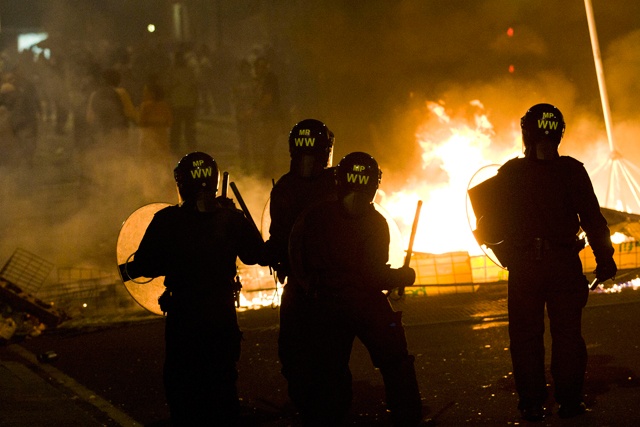No Refuge Between Bricks and Batons
One incident of a journalist being attacked quickly turned to two, then three, then five.

By the time a panic-stricken police officer diverted our taxi from Tottenham High Road, two police cars and several shops were burning, and a young woman had been violently arrested by riot squad officers outside the local police station, stoking an already tinderbox atmosphere. We arrived at the first police line. Several large explosions rocked the neighbourhood.
Gathering crowds of locals seemed immediately hostile to people with cameras. Insults referring to the Murdoch "hackgate" scandal came quick and fast. "Only now do you come here, when we're on fire," said one man.
Other photographers filled us in. One incident of a journalist being attacked quickly turned to two, then three, then five. One colleague recounted seeing a young photographer being dragged down a back street by a gang of men, his equipment smashed and thrown in a fire.
The police, under orders to permit no one past the cordon, directed us into the troubled areas through dark unlit streets filled with groups of hooded people.
It was clear that we had little to no friends here. We took helmets as protection, but decided against stab vests: We felt movement and speed would be more of an advantage and it would be safer to keep a good distance from the most agitated groups.
Inside the crowds of rioters it was incredibly tense and we were on guard from all sides at every second. We turned the camera on one man after asking his permission to interview him. He blamed an out-of-control and "racist" police force for sparking the riot. He talked about Mark Duggan being shot the previous Thursday in Tottenham, but also claimed his cousin in Birmingham had been killed by a week earlier, although police had reported that his cousin committed suicide by jumping off a balcony from the 11th floor of a tower block.
We spoke to other people, explaining we understood what had happened and knew there were greater underlying issues as to why people were rioting; Duggan's shooting had just been the final straw.
This diffused the tension somewhat. Several people threw bottles and bricks at us, but others quickly stopped them.
Several times we were told we would be stabbed if we got anyone's face on film. So we kept the video shots of rioters short, concentrating on police.
As a double-decker bus exploded, setting the surrounding buildings on fire, the Catch-22 situation became very apparent. The more looting and the more fires ignited, the harder the police came in; and the more people got hurt, the more the anger rose and the looting and burning and retaliation to the police increased.
After being caught in a side street under a hail of bottles and several failed police charges, and after having to order other photographers not to use a flash with their cameras unless they would like us all to die, we decided it was getting too hostile in front of the police line.
Kids as young as 12 or 13 years were threatening to kill us. They were drinking straight vodka from bottles looted from the burning off-licence. The police charged again, gained ten metres of ground, and we remained behind them for the rest of the night.
Being behind the police lines opens up new dangers. The missiles meant for the police miss their targets and you are next in line. You are also in direct view of the rioters and can be seen by them to be working with the police; you become a greater target and the need for solid cover becomes a serious priority. It is also a very careful balance of getting your shots, not getting too close to the police and obstructing their operation.
Three of us walked back along the High Road as the sun rose, revealing the extent of damage to the neighbourhood. Reports were coming in that some 400 people had been made homeless.
A young local man latched on to us as a way of getting home through police lines. He said he knew Mark Duggan, said Duggan was well-respected, a strong figure, and said the police killing him had sparked a hundred issues in the community. He said Duggan was probably a skunk dealer, like many others he knew, but added there were many worse problems in the community and the country than those that sold weed. He talked of a global elite ruling the world, people his community would never meet. He admitted to rioting himself that night and admitted the rioting was doing nothing but justifying an increase in oppressive laws that would affect everyone.
"But what are you supposed to do?" He said. "You sit on the side line, they ignore you. You publicly protest, they ignore you. What's left? Rioting and destruction. But from all this they will create new laws and then we're all fucked."
































































































